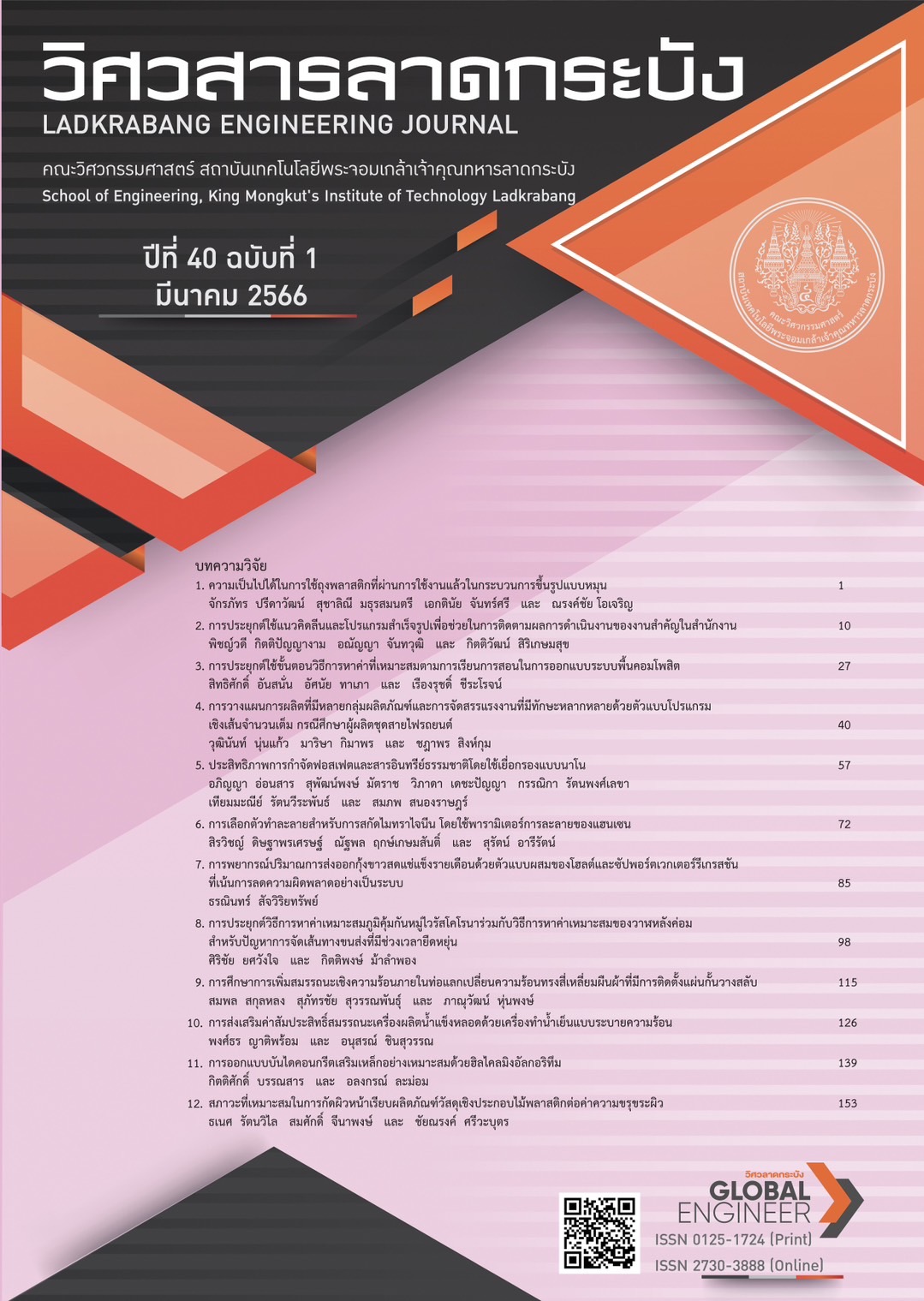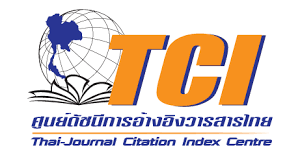An Improvement of Tubular-Ice Making Machine Coefficient of Performance with a Commercial Water Chiller
Keywords:
Batch process, Tubular ice maker, Commercial water chiller, Precooling systemAbstract
The purpose of this study is to increase the coefficient of performance (COP) of the tube ice maker by using commercial water chillers and plate heat exchanger. The research was done by developing a mathematical model for predicting the thermal behavior of a pre-cooling system. By comparing predicted temperatures with measured temperatures, it is seen that both are agreed well and mathematical models can be used to predict thermal performance. The circulating water flow model provides a higher effectiveness ( ) at the same number of transfer units (NTU). with a certain heat capacity rate ratio of the feed water to the chilled water (wr). The pre-cooling system was tested with the tube ice machine. It was found that when the system reduces the feed water temperature to 12°C with the temperature of return water to chiller not more than that required by commercial water chillers at 12.78 °C , the batch time can be reduced by 9.1 minutes, increase overall power consumption can be reduced by 7.47 kw·h and COP can be increased from 1.89 to 2.48. This resulted could be applied to pre-cooling or pre-heating of any batch production process.
References
A. Thongdee and A. Chinsuwan, “An optimization of the components and operating conditions of a pre-cooling system for tubular ice making machines,” Energy Procedia, vol. 157, pp. 602–610, 2019, doi: 10.1016/j.egypro.2018.11.225.
S. Nakornsri, R. Suntivalakorn and K. Thanutwutthigorn, “Performance improvement of tubular-ice making machine by reducing the feed water temperature with shell and tube heat exchanger,” Applied Mechanics and Materials, vol. 564, pp. 298–303, 2014, doi:10.4028/www.scientific.net/AMM.564.298.
C. Tangthieng “A Numerical Study for Improvement of a Tubular-Ice Making Process by Employing the External Fins on an Ice-Making Tube,” presented at the 21th Conference of Mechanical Engineering Network of Thailand, Chonburi, Thailand, Oct. 17–19, 2007, pp. 259–266.
N. Pannucharoenwong, S. Saeng-Uthai, P. Promteerawong, C. Benjapiyaporn, S. Theerakulphisut and J. Benjapiyaporn, “Experiment to enhance the efficiency of tubular ice production machine using the installation of wavy fin on ice making tube,” Materials Today: Proceedings, vol. 4, no. 5, pp. 6296–6305, 2017, doi: 10.1016/j.matpr.2017.06.130.
N. Kayansayan and M. Ali Acar, “Ice formation around a finned-tube heat exchanger for cold thermal energy storage,” International Journal of Thermal Sciences, vol. 45, no. 4, pp. 405–418, 2006, doi: 10.1016/j.ijthermalsci.2005.05.009.
C. Kandilli and A. Koclu, “Assessment of the optimum operation conditions of a plate heat exchanger for waste heat recovery in textile industry,” Renewable and Sustainable Energy Reviews, vol. 15, no. 9, pp. 4424–4431, 2011, doi:10.1016/j.rser.2011.07.110.
D. Lee and C. Kang, “A study on development of the thermal storage type plate heat exchanger including PCM layer,” Journal of Mechanical Science and Technology, vol. 33, pp. 6085–6093, 2019, doi: 10.1007/s12206-019-1152-x.
R. M. Saeed, J. P. Schlegel, R. Sawafta and V. Kalra, “Plate type heat exchanger for thermal energy storage and load shifting using phase change material,” Energy Conversion and Management, vol. 181, pp. 120–132, 2019, doi: 10.1016/j.enconman.2018.12.013.
H. Ma, L. Yin, X. Shen, W. Lu, Y. Sun, Y. Zhang and N. Deng, “Experimental study on heat pipe assisted heat exchanger used for industrial waste heat recovery,” Applied Energy, vol. 169, pp. 177–186, 2016, doi:10.1016/j.apenergy.2016.02.012.
N. H. S. Tay, M. Belusko, and F. Bruno, “An effectiveness-NTU technique for characterising tube-in-tank phase change thermal energy storage systems,” Applied Energy, vol. 91, no. 1, pp. 309–319, 2012, doi:10.1016/j.apenergy.2011.09.039.
W. S. Janna and R. P. Chhabra, “Plate and Frame and Cross Flow Heat Exchangers,” in Design of Fluid Thermal Systems, 4th ed., Stamford, CT: Cengage Learning, 2015, ch. 10, sec. 3, pp.529–532.
Downloads
Published
How to Cite
Issue
Section
License
Copyright (c) 2023 Faculty of Engineering, King Mongkut’s Institute of Technology Ladkrabang

This work is licensed under a Creative Commons Attribution-NonCommercial-NoDerivatives 4.0 International License.
The published articles are copyrighted by the School of Engineering, King Mongkut's Institute of Technology Ladkrabang.
The statements contained in each article in this academic journal are the personal opinions of each author and are not related to King Mongkut's Institute of Technology Ladkrabang and other faculty members in the institute.
Responsibility for all elements of each article belongs to each author; If there are any mistakes, each author is solely responsible for his own articles.







